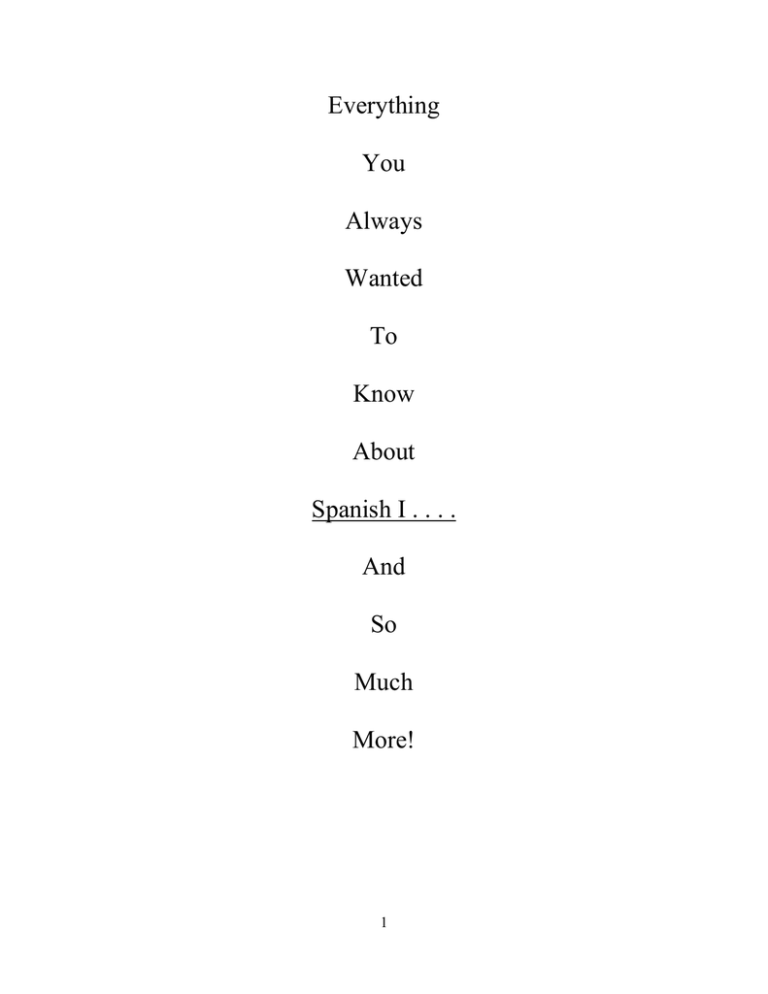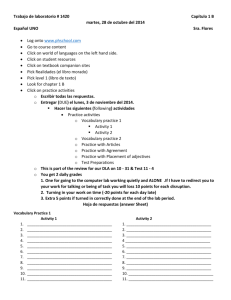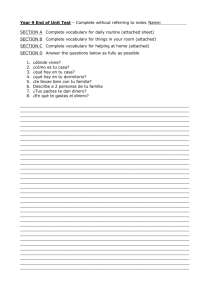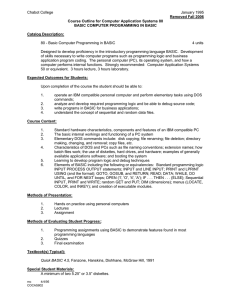Everything You Always
advertisement

Everything You Always Wanted To Know About Spanish I . . . . And So Much More! 1 00000 Table of Contents Saludos y Despedidas (Greetings and Good-byes) ............................................... 3 SER and ESTAR ...................................................................................................... 3/4 Numbers ............................................................................................................... 4 Days of the week / months of the year / telling dates ........................................ 4 Telling time .......................................................................................................... 4 Asking / telling ages ............................................................................................. 4 Noun / adjective agreement ................................................................................ 5 Personal pronouns ............................................................................................... 5 Present tense conjugation or regular verbs ......................................................... 5 Interrogatives (question words) ........................................................................... 5/6 Introductions ......................................................................................................... 6 Contractions .......................................................................................................... 6 Verbs that are irregular in the Present tense ....................................................... 6 “have to” . . . expressions .................................................................................... 6 “going to” . . . expressions ................................................................................... 7 Invitations ............................................................................................................. 7 Possessive Adjectives ............................................................................................ 7 2 00000 Saludos y despedidas Hola ¿Cómo te llamas? Me llamo ______ Buenos días Buenas tardes Buenas noches ¿Cómo estás / está / están? Estoy . . . Está . . . Están . . . bien / mal / así, así Hasta mañana hasta luego hasta tarde hasta pronto 00000 SER vs ESTAR SER – to be (permanent / telling time) ESTAR – to be (location / temporary condition / feelings SER Characteristics Nationality Origin Telling time Equal to ESTAR True Love Forever e o e m c e p a l o t i r a l a t i r i n y o g n s conditons 3 SER ESTAR Soy – I am Eres – you (fam.) are Es – he / she / it is You (ud) are somos – we are sois – you are (in Spain) son – they / you (uds) are estoy – I am estás – you (fam.) are está – he / she / it is you (ud) are estamos – we are estáis – you are (in Spain) están – they /you (uds)are 00000 Numbers 0-2,000,000 cero uno dos tres cuatro cinco seis siete ocho nueve diez once doce trece catorce quince dieciséis diecisiete dieciocho diecinueve veinte veintiuno veintidós veintitrés veinticuatro veinticinco veintiséis veintisiete veintiocho veintinueve treinta cuarenta cincuenta sesenta setenta ochenta noventa cién / ciento ciento y uno ciento y dos etc. doscientos trescientos cuatrocientos quinientos seiscientos setecientos ochocientos novecientos mil dos mil un millón dos millones etc. 00000 Days of the week / months of the year / telling dates Days of the week: lunes, martes, miércoles, jueves, viernes, sábado, domingo Months of the year: enero, febrero, marzo, abril, mayo, junio, julio, agosto, septiembre, octubre, noviembre, diciembre To ask / tell the date, say that it is the number of the day, then the month (the reverse of English). What is the date [today]? ¿Cuál es la fecha [hoy]? It is July fourth. Es el cuatro de julio. It is May twenty-second. Es el veintidós de mayo For the first of the month, use primero instead of uno. It is January first. Es el primero de enero. Telling time ¿Qué hora es? Es la una es la una y cinco es la una y cuarto (quince) es la una y media (treinta) Son las dos son las dos y diez son las dos y cuarto (quince) son la dos y media (trienta) Son las dos menos veinte (son las dos y cuarenta) ¿A qué hora es la clase de español? (at) what time is Spanish class? La clase de español es a las once y veinte. Spanish class is at eleven twenty Asking / telling ages ¿Cuántos años tienes? Tengo _____ años. How old are you? (How many years do you have?) I am _____ years old. (I have ____ years.) 4 00000 Noun/Adjective agreement Nouns have gender [masculine or feminine]. Generally if a noun ends in ‘o’ it is masculine. If it ends in ‘a’, ‘ción’, ‘sión’, ‘tad’ or ‘dad’ it is usually feminine. Nouns have number [singular or plural] Adjectives must agree in number and gender with the noun they describe El libro rojo los libros rojos la casa roja las casas rojas Un libro rojo unos libros rojos una casa roja unas casas rojas 00000 Personal Pronouns Yo – I Tú – you (familiar – 1st name basis) Él / ella – he she Usted (ud) you – formal – title + last name nosotros – we vosotros – you (several friends in Spain) ellos / ellas – they Ustedes (uds) – you – formal 00000 Present tense conjugation of regular verbs -AR verbs HABLAR – to speak , to talk hablo Hablas habla hablamos habláis hablan -ER verbs COMER – to eat como comes come comemos coméis comen -IR verbs VIVIR – to live vivo Vives vive vivimos vivís viven 00000 Interrogative (question) words Who? ¿quién? Where? ¿dónde? What? ¿qué? Why? ¿por qué? When? ¿cuándo? How? ¿cómo? 5 Where (to)? ¿adónde? ¿cuánto (a)? How much? Where(from)? ¿de dónde? Which? ¿cuál? ¿Cuántos(as) How many? 0000 Introductions Rosa, te presento a Teresa. Roas y Ana, les presento a Teresa. Sr Vargas, le presento a Teresa Sr y Sra Vargas, les presento a Teresa. 00000 Contractions a + el becomes al ‘Van a el parque’ becomes ‘Van al parque’ de + el becomes del ‘la casa de el profesor’ becomes ‘la casa del profesor’ 00000 Verbs that are irregular in the Present tense IR – to go HACER – to make, to do SABER – to know VER – to see TENER – to have VENIR – to come voy hago sé veo tengo vengo vas haces sabes ves tienes vienes va hace sabe ve tiene viene vamos hacemos sabemos vemos tenemos venimos vais hacéis sabéis veis tenéis venéis 00000 “have to” / “must” expressions To show that someone ‘has to’ or ‘must’ do something: Step 1 - Use the correct form of TENER to show who has to do it Step 2 – follow with QUE Step 3 – add the infinitive of the verb showing the action EX: I have to study – TENGO QUE ESTUDIAR We must leave early - TENEMOS QUE SALIR temprano 6 van hacen saben ven tienen vienen 00000 Expressing a future action using the Present tense To show that someone is going to do something in the near future: Step 1 – use the correct form of IR to show who is going to do it Step 2 – follow with A Step 3 – add the infinitive of the verb showing what will be done EX: I am going to study tonight - VOY A ESTUDIAR esta noche. We are going to leave early - VAMOS A SALIR temprano 00000 Invitations Let’s go Let’s take the bus. Why don’t we play soccer? I’m sorry, but . . . ¡vamos! Vamos a tomar el autobus. ¿Por qué no jugamos fútbol? Lo siento, pero . . . 00000 Possessive Adjectives Mi(s) libro(s) my book(s) Nuestro(s) libro(s) our book(s) Nuestra(s) casa(s) our house(s) vuestro(s) libro(s) your book(s) vuestra(s) casa(s) your house(s) su(s) libros their / your book(s) Tu(s) libro(s) your book(s) Su(s) libro(s) his / her / its / your (ud) book(s) Beto es nuestro primo. ¿Rosa, tienes mis libros? Beto is our cousin. Rosa, do you have my books? 7


